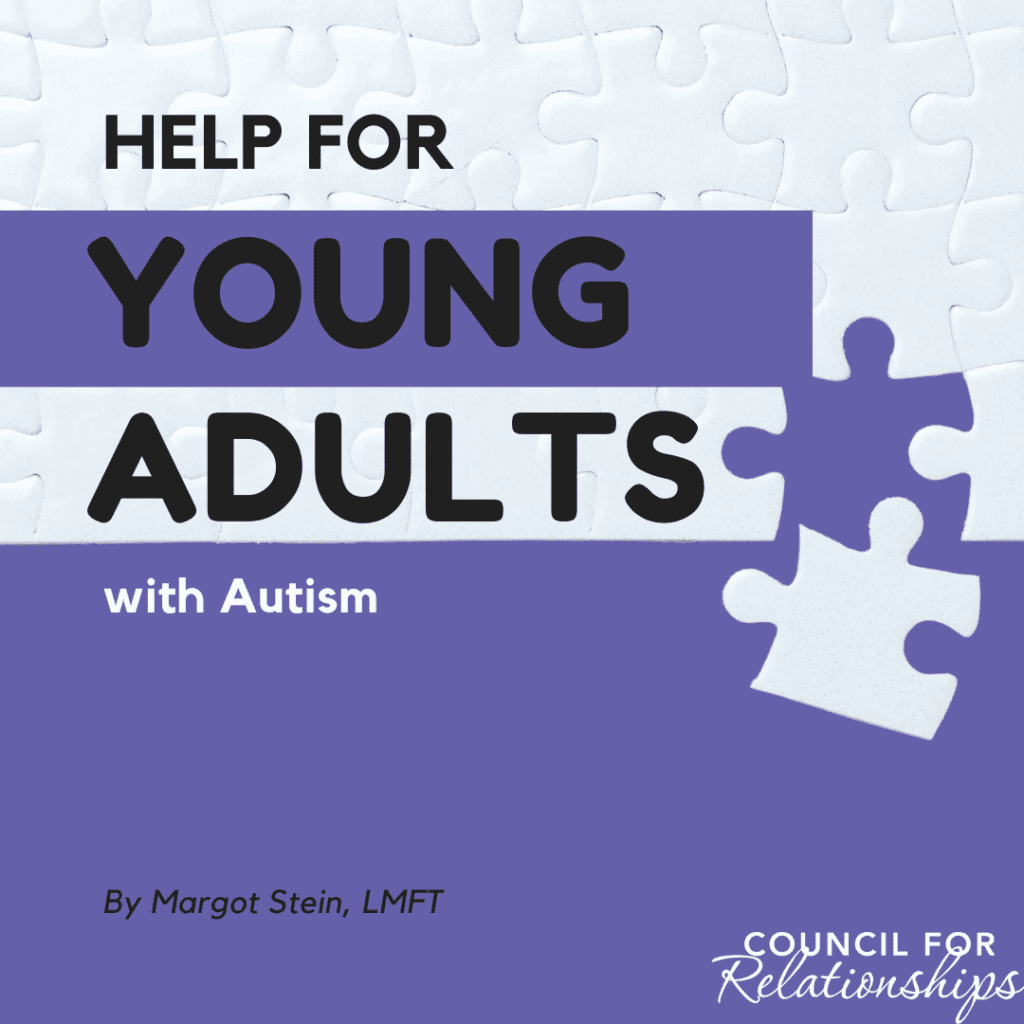Help for Young Adults with Autism
Navigating young adulthood can be challenging for anyone, but for individuals with autism, the transition comes with unique obstacles. Understanding how to help young adults with autism can make a profound difference in their ability to build meaningful relationships, succeed in school or work, and maintain their emotional well-being. Whether you’re a family member, caregiver, or mental health professional, having the right resources and strategies is essential to fostering growth and independence during this critical stage of life.
At Council for Relationships, we are committed to providing support tailored to the needs of young adults with autism and their families. From improving social communication skills to addressing anxiety and sensory challenges, our therapists offer specialized services designed to empower individuals and strengthen family bonds. This blog explores practical tips, therapy options, and ways to create a supportive environment that encourages growth.
If you’ve ever wondered how to help a young adult with autism navigate the complexities of daily life while maintaining confidence and self-esteem, you’re in the right place. Together, we can create a path forward that promotes their success and well-being. Read on to discover actionable advice and mental health resources.
Help for Young Adults with Autism and their Families
Having been around autistic young people since my youngest son was born with the disorder nearly 20 years ago, I recently began conducting small social groups for young men with autism. Our goals are simple: to provide a safe space for young adults with social-emotional deficits to gather weekly with each other, practice listening and sharing skills, play games, explore emotions, and take occasional risks to reveal a part of themselves to others.
Sharing is often met with warmth, enthusiasm, and encouragement from the other members of the group. We frequently end our sessions with a game called “Two Truths and a Lie,” which gives us plenty of laughs as each participant tries to nonchalantly pull off a lie embedded in two truthful statements.
During the pandemic, these sessions occur on my telehealth platform, which gives us an opportunity to share items, objects, and pets from each person’s home environment.
Similar to working with younger kids, working with young adults on the autism spectrum requires attention to specific deficits with a plan to build skills, carefully chosen exercises to elicit buy-in, lots of interactivity and spontaneity, an energetic attitude, and absolute authenticity. Just like in life, things don’t always go according to plan.
Sometimes a topic I’ve planned bombs or feels inaccessible, a game experiences glitches on the digital platform, or a member of the group is temporarily suspended from using electronics. But this is a good life lesson that we can shift gears cheerfully and swiftly. For this reason, I always have a few back-up activities planned.
Lately, we have been exploring emotional opposites. I ask, “What is the opposite of enthusiastic?” “What is the opposite of depressed?” “Once identified, can you make up a sentence using the word ‘shame’”?
But these young men are not children. And they reveal their lives to each other in surprising and touching ways. Birthdays, breakups, job responsibilities, mistakes they’ve made, and even deaths of loved ones have all found their way into the group. One mom recently told me her son seems lighter, more flexible, his nervous system somehow more organized, after our sessions.
I also run a monthly group for the parents of special needs teens. There, we talk about the challenges of disciplining kids with social and emotional deficits. We seek ways of managing behavior towards younger siblings, getting kids who say “no” to every suggestion to find the flexibility to give something a try, setting limits that are meaningful, while using positive behavior supports like those espoused by Applied Behavior Analysis (ABA) Therapy, to increase motivation as well as compliance with parents’ desired outcomes.
Often, it’s helpful to share and listen and realize that we are not alone in this struggle. Sure, we can offer strategies and suggestions which may or may not work, but at the end of the day, it’s the shared journey that brings comfort and gives each parent renewed strength to return to the difficult work of parenting these kids, bringing a little bit of hope and a smile back to their families.
How to Help Young Adults with Autism Thrive
While the rest of the world is just beginning to realize how very challenging it is to parent a special needs child; While workplaces in this country are just beginning to grapple with the employment needs of young adults with ASD; And while governmental funds ebb and flow erratically to support families with care, education, and housing needs for disabled adults, Systemic Family Therapy can be a place where the whole family feels cared for, sheltered, and understood. It is a place where the experts don’t have the perfect answers, but where we can search for workable solutions together.
Explore More Insights from CFR Therapists and Psychiatrists
Looking for more expert advice on mental health and relationships? Council for Relationships therapists and psychiatrists regularly share their knowledge through insightful blogs, helping readers navigate life’s challenges and build stronger connections.
Sign up for our mailing list to receive these blogs directly in your email feed. Stay informed with tips, strategies, and stories to inspire your journey toward emotional and relational well-being.
About the Author
Margot Stein, LMFT, is a Staff Therapist at Council for Relationships. Contact Margot if you have questions about help for young adults with autism or if you would like to request an in-person or online therapy appointment. Council for Relationships has a team of over 85 clinicians, including therapists and psychiatrists, who are ready to help and are currently accepting new clients. If you’re ready to take the next step toward healing, schedule an appointment with Margot or one of our highly qualified therapists today.
Get Matched with a CFR Therapist →


